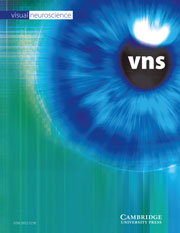Crossref Citations
This article has been cited by the following publications. This list is generated based on data provided by
Crossref.
Morgan, Josh L
Schubert, Timm
and
Wong, Rachel OL
2008.
Developmental patterning of glutamatergic synapses onto retinal ganglion cells.
Neural Development,
Vol. 3,
Issue. 1,
Jakobs, Tatjana C.
Koizumi, Amane
and
Masland, Richard H.
2008.
The spatial distribution of glutamatergic inputs to dendrites of retinal ganglion cells.
Journal of Comparative Neurology,
Vol. 510,
Issue. 2,
p.
221.
Dumitrescu, Olivia N.
Pucci, Francesco G.
Wong, Kwoon Y.
and
Berson, David M.
2009.
Ectopic retinal ON bipolar cell synapses in the OFF inner plexiform layer: Contacts with dopaminergic amacrine cells and melanopsin ganglion cells.
Journal of Comparative Neurology,
Vol. 517,
Issue. 2,
p.
226.
Percival, Kumiko A.
Jusuf, Patricia R.
Martin, Paul R.
and
Grünert, Ulrike
2009.
Synaptic inputs onto small bistratified (blue‐ON/yellow‐OFF) ganglion cells in marmoset retina.
Journal of Comparative Neurology,
Vol. 517,
Issue. 5,
p.
655.
Percival, Kumiko A.
Martin, Paul R.
and
Grünert, Ulrike
2011.
Synaptic inputs to two types of koniocellular pathway ganglion cells in marmoset retina.
Journal of Comparative Neurology,
Vol. 519,
Issue. 11,
p.
2135.
SCHEIN, STAN
NGO, IVY TRAN
HUANG, TERESA M.
KLUG, KARL
STERLING, PETER
and
HERR, STEVE
2011.
Cone synapses in macaque fovea: I. Two types of non-S cones are distinguished by numbers of contacts with OFF midget bipolar cells.
Visual Neuroscience,
Vol. 28,
Issue. 1,
p.
3.
Soto, Florentina
Bleckert, Adam
Lewis, Renate
Kang, Yunhee
Kerschensteiner, Daniel
Craig, Ann Marie
and
Wong, Rachel OL
2011.
Coordinated increase in inhibitory and excitatory synapses onto retinal ganglion cells during development.
Neural Development,
Vol. 6,
Issue. 1,
ABBOTT, CARLA J.
PERCIVAL, KUMIKO A.
MARTIN, PAUL R.
and
GRÜNERT, ULRIKE
2012.
Amacrine and bipolar inputs to midget and parasol ganglion cells in marmoset retina.
Visual Neuroscience,
Vol. 29,
Issue. 3,
p.
157.
Wong, Raymond C. S.
Cloherty, Shaun L.
Ibbotson, Michael R.
and
O'Brien, Brendan J.
2012.
Intrinsic physiological properties of rat retinal ganglion cells with a comparative analysis.
Journal of Neurophysiology,
Vol. 108,
Issue. 7,
p.
2008.
Abbas, Syed Y.
Hamade, Khaldoun C.
Yang, Ellen J.
Nawy, Scott
Smith, Robert G.
Pettit, Diana L.
and
Zeck, Guenther
2013.
Directional Summation in Non-direction Selective Retinal Ganglion Cells.
PLoS Computational Biology,
Vol. 9,
Issue. 3,
p.
e1002969.
Moritoh, Satoru
Komatsu, Yusuke
Yamamori, Tetsuo
Koizumi, Amane
and
Chiao, Chuan-Chin
2013.
Diversity of Retinal Ganglion Cells Identified by Transient GFP Transfection in Organotypic Tissue Culture of Adult Marmoset Monkey Retina.
PLoS ONE,
Vol. 8,
Issue. 1,
p.
e54667.
Yoshimatsu, T.
Suzuki, S.C.
and
Wong, R.O.L.
2013.
Cellular Migration and Formation of Neuronal Connections.
p.
687.
Solomon, Samuel G.
and
Rosa, Marcello G. P.
2014.
A simpler primate brain: the visual system of the marmoset monkey.
Frontiers in Neural Circuits,
Vol. 8,
Issue. ,
McKeefry, Declan
Kremers, Jan
Kommanapalli, Deepika
Challa, Naveen K.
Murray, Ian J.
Maguire, John
and
Parry, Neil R. A.
2014.
Incremental and decremental L- and M-cone-driven ERG responses: I Square-wave pulse stimulation.
Journal of the Optical Society of America A,
Vol. 31,
Issue. 4,
p.
A159.
Kommanapalli, Deepika
Murray, Ian J.
Kremers, Jan
Parry, Neil R. A.
and
McKeefry, Declan J.
2014.
Temporal characteristics of L- and M-cone isolating steady-state electroretinograms.
Journal of the Optical Society of America A,
Vol. 31,
Issue. 4,
p.
A113.
Saha, Susmita
Greferath, Ursula
Vessey, Kirstan A.
Grayden, David B.
Burkitt, Anthony N.
and
Fletcher, Erica L.
2016.
Changes in ganglion cells during retinal degeneration.
Neuroscience,
Vol. 329,
Issue. ,
p.
1.
Santana, Nelyane Nayara M.
Silva, Eryck H. A.
dos Santos, Sâmarah F.
Costa, Miriam S. M. O.
Nascimento Junior, Expedito S.
Engelberth, Rovena Clara J. G.
and
Cavalcante, Jeferson S.
2023.
Retinorecipient areas in the common marmoset (Callithrix jacchus): An image-forming and non-image forming circuitry.
Frontiers in Neural Circuits,
Vol. 17,
Issue. ,

